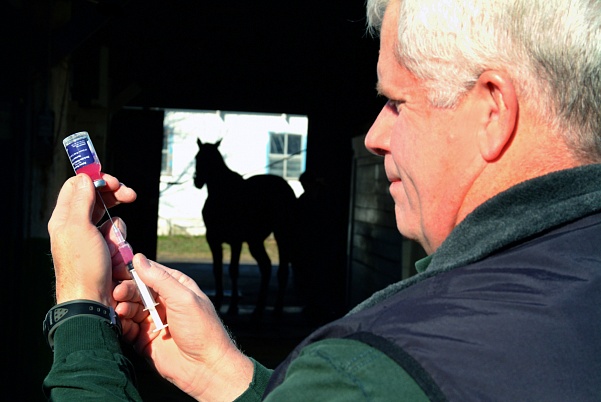Vaccination - cure from losses
https://www.traditionrolex.com/42
https://www.traditionrolex.com/42

Disease prevention is better than cure, it is a well-known fact. Therefore, one must carry out a number of preventive measures for horses including the study of blood, deworming and vaccinations. This is quite an effective way to prevent many contagious diseases. Vaccinations are called a "cure from losses" for a good reason.
On the territory of the Russian Federation, the following vaccinations against the following diseases are mandatory: anthrax, equine influenza, dermatomycosis (commonly known as ringworm) and leptospirosis, if no blood test is made. In affected regions, horses also get vaccinated against rabies, equine rhinopneumonitis. Although not required, it is very desirable to vaccinate horses against tetanus. Twice a year, the blood serum of horses is studied for glanders, INAN (infectious equine anaemia) and equine syphilis disease. The blood of a horse is examined for leptospirosis in the case if the animal has not been vaccinated against it. Preventative deworming should be held twice a year, and preferably quarterly.
Breeding horses that are used for breeding must be vaccinated annually against equine rhinopneumonitis (also known as viral abortion). Every two to three years, horses are to be vaccinated against tetanus, and in the areas where there are cases of rabies - every three years, against this disease. In some cases, they give vaccines against viral arteritis striking horses, paratyphoid (salmonellosis) abortion, and as of 1999,as necessary, against glanders.
There are very serious equine infectious diseases which require a lengthy quarantine, sick animals are supposed to be eliminated: INAN (infectious anemia), equine syphilis disease (covering disease), glanders and others. That’s why there are always blood tests for horses to be sold, transported, moved abroad for competitions and exhibitions, exporting abroad. Without such tests, no animal may be issued a veterinary certificate or allowed to be transported anywhere beyond the region, republic or country.
Non-contagious (non-infectious) diseases are not dangerous to humans or other animals.
When a horse falls ill, it is necessary to turn to a veterinarian, but people knowledgeable about horses can at least administer first aid while waiting for the vet.
Author: Edition
https://www.traditionrolex.com/42








Comments (0)